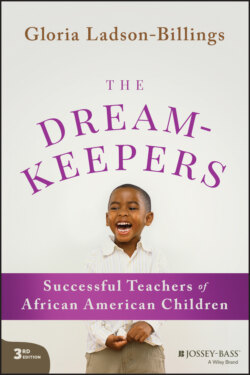Читать книгу The Dreamkeepers - Gloria Ladson-Billings - Страница 15
A Study of Effective Teaching for African Americans
ОглавлениеThis book examines effective teaching for African American students and how such teaching has helped students not only achieve academic success but also achieve that success while maintaining a positive identity as African Americans. It is about the kind of teaching that promotes this excellence despite little administrative or collegial support. It is about the kind of teaching that the African American community has identified as having its children's best interests at heart. It is about the kind of teaching that helps students choose academic success.
This book is based on my study of successful teachers of African American students, which was funded by a 1988 postdoctoral grant from the National Academy of Education's Spencer Foundation. I conducted this research during the 1988–89 and 1989–90 school years, with an additional in-depth study of two classrooms in the 1990–91 school year. The opinions expressed in this publication do not necessarily reflect the position, policy, or endorsement of the National Academy of Education or of the Spencer Foundation.
I make a distinction between excellent teaching and excellent teachers purposely. Although each of the teachers who participated in my study are superb individually, this book looks at a teaching ideology and common behaviors, not at individual teaching styles. By choosing this path, I lose some of the distinctive and rich personal qualities of these marvelous individuals. However, I sacrifice this richness in favor of a focus on “the art and craft of teaching.”42 This focus is important because it minimizes the tendency to reduce the research findings to individual idiosyncrasies and to suggest a “cult-of-personality” explanation for effective teaching. Looking carefully at the teaching, while offering the teachers as exemplars, provides a useful heuristic for teachers and teacher educators who wish to take on the challenge of being successful with African American students.
This book is about teaching practice, not about curriculum. Much of the purported reforms and the debate about our schools focuses on curriculum: What should we teach? Whose version of history should we offer? What priority should different subject matters be given? But it is the way we teach that profoundly affects the way that students perceive the content of that curriculum.
My notions in this domain are strongly aligned with Giroux and Simon's thoughts on critical pedagogy:
Pedagogy refers to a deliberate attempt to influence how and what knowledge and identities are produced within and among particular sets of social relations. It can be understood as a practice through which people are incited to acquire a particular “moral character.” As both a political and practical activity, it attempts to influence the occurrence and qualities of experiences. When one practices pedagogy, one acts with the intent of creating experiences that will organize and disorganize a variety of understandings of our natural and social world in particular ways … . Pedagogy is a concept which draws attention to the processes through which knowledge is produced.43
Because of this pedagogical view, I went into the classrooms intending to examine both “the political and the practical.” I wanted to see not only why a certain kind of teaching helped the students to be more successful academically but also how this kind of teaching supported and encouraged students to use their prior knowledge to make sense of the world and to work toward improving it.
In the next chapter, I begin to examine the concept of culturally relevant teaching and how it can improve the educational lives of African American students. As is true of most researchers, it is my hope that this research will find broad applicability and be seen as useful for teaching students of any race or ethnicity.
